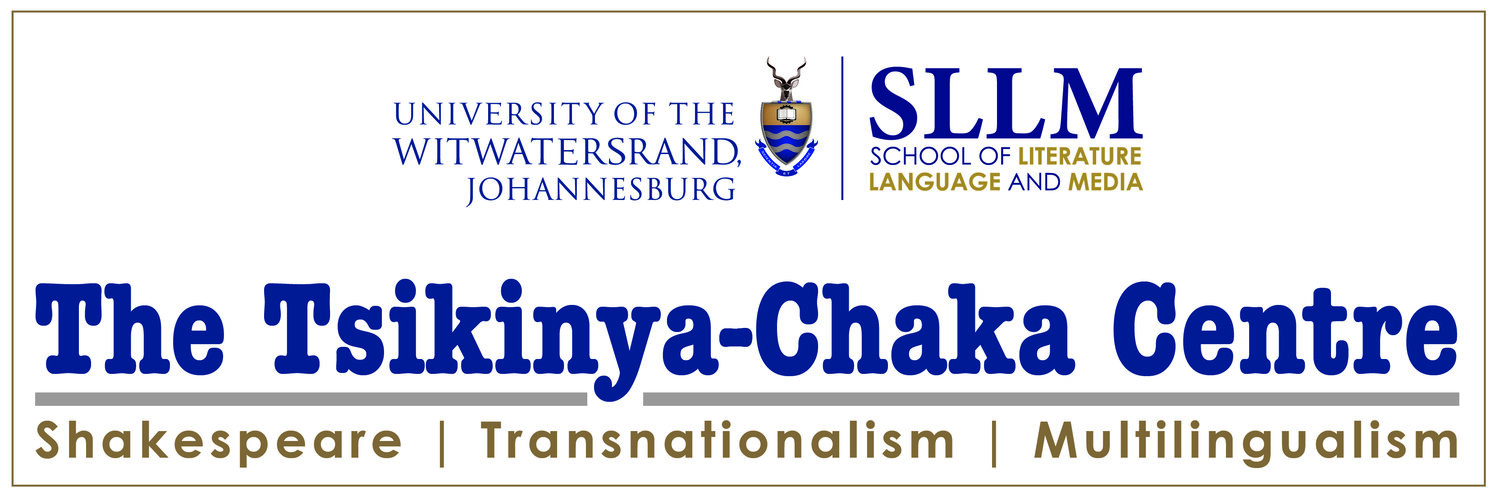Spotlight on: Multilingualism and Diversities Research
The Tsikinya-Chaka Centre’s mandate includes enabling teachers and learners to engage with Shakespeare in multilingual contexts, as well as supporting creative practitioners embracing translation and adaptation. But the TCC’s interest in language activism and advocacy extends beyond Shakespeare, of course! So we thought it would be appropriate to shine a spotlight on some of the amazing work that our affiliates, friends and colleagues are doing in this sphere.
One strand of TCC research and practice entails educators, artists and scholars exploring Kaaps Shakespeares. TCC director Chris Thurman attended the third Kaaps Symposium, held on 15-16 August at the University of the Western Cape's Iyatsiba Lab in Woodstock, Cape Town. The previous Kaaps symposia were held in 2012 and 2022. Convenor Quentin Williams (director of UWC’s Centre for Multilingualism and Diversities Research and chairperson of the Society for the Advancement of Kaaps) notes that, while the first symposium asked the question, “Why focus now on Kaaps?”, and the second gathering “raised searching questions about standardisation, the need to capture all the varieties of Kaaps, and what we can do in the short and long term to raise the functions of Kaaps in schools and universities”, the call for papers for the third symposium asked, “What about its scientific, epistemic future? And how have researchers, activists, teachers and scientists actually mapped the future study of Kaaps?”
The third Kaaps Symposium was held at the University of the Western Cape's Iyatsiba Lab
Quentin Williams, Director of the CMDR (Image: Esa Alexander)
In his account of the symposium on LitNet, Williams writes that “we received a variety of submissions that covered research on Kaaps in basic and higher education, bilingualism/multilingualism, language contact and change, lexicography, linguistic citizenship, standardisation, general linguistics, translation studies, Kaaps variation studies, religion, identity, race, migration, nationalism, decoloniality, language activism, Kaaps food and security, and the intellectualisation of Kaaps”. Keynote addresses were delivered by Williams, Michael le Cordeur, Ronelda S. Kamfer, Nathan Trantraal and Erin Pretorious. The full symposium programme can be downloaded here.
At the CMDR, Williams heads the project to produce a trilingual Kaaps/Afrikaans/English dictionary, the Drietalige Woordeboek van Kaaps (DWK). Their lexicographical counterparts at the largest and most comprehensive descriptive Afrikaans dictionary, the Woordeboek van die Afrikaanse Taal (WAT), are also committed to navigating and documenting the relationship between Kaaps and Afrikaans - although, on this and other scores, as Williams recounts, scholars disagree “passionately and scientifically”. Why should Kaaps be called a language and not a dialect, or an “informal variety” as it is currently marked in the WAT corpus? Other yet-to-be-answered questions include, “What will the Trilingual Dictionary of Kaaps look like when it is published? Should we call for talk about formalisation instead of standardisation? Which orthographic markers represent which words best? When will we develop our grammar and spelling guide? And when, ultimately, will Kaaps learners in school and university get to read and write in Kaaps?”
And should it be called Kaaps? Or Afrikaaps, or Kaapse Afrikaans? “We know that there must be subtle – or even explicit – general linguistic and scientific differences in the system, or holdovers of variation sociolinguistics and dialectology,” observes Williams, “But we also know that of all the labels, the label Afrikaaps does the most decolonial work by far.”
Williams concludes his overview: “In a previous article, I suggested openly and candidly that Kaaps is the future of Afrikaans. I take that back: Kaaps has its own future; it is now in the hands of us all. Help us secure the future of this historically marginalised and indigenous language.”
Another member of the CMDR, Robyn Tyler, is a TCC affiliate who will be familiar to regular visitors to this site! We profiled her 2023 book Translanguaging, Coloniality and Decolonial Cracks, an ethnography of bilingual science learning in South Africa that connects microanalyses of classroom discourse to broader themes of de/coloniality in education. Tyler is one of the founders of iSayensi Yethu (Our Science), which aims to provide relevant, bilingual English/isiXhosa materials to Grade 4 learners and teachers.
Robyn Tyler, TCC affiliate and Senior Researcher at the CMDR
This is one of many projects driven by Tyler and her colleagues at bua-lit, the language and literacy collective that “challenges the narrow skills-based view of literacy and puts forward dynamic and cutting-edge ideas about how literacy and language can be viewed, practised and taught”. A key focus is bi- and multilingualism - because, as Tyler, Brian Ramadiro, Carolyn McKinney and Xolisa Guzula remind readers in this 2022 article, “Decades-long research into oral code-switching has shown it can be effective in classrooms.” Most South African teachers have, until now, had to adopt this bilingual teaching approach illicitly because “code-switching is not supported by bilingual materials or assessments and is often frowned upon by department officials. This is because of fears English will be compromised as well as colonial ideas about African languages being irrelevant for use in education.”
Fortunately, thanks to the tireless work of researchers, educators and language advocates, a major policy shift was signalled by the Department of Basic Education’s announcement earlier this year that South African schools will incrementally offer mother tongue-based bilingual education from Grade 4 in 2025. Lots of hard work still lies ahead in shifting attitudes towards multilingualism in education, as well as enabling teachers and learners to develop and implement these practices.
But, as demonstrated in a new documentary, Free to Learn: Soze Ungayibambi!, the rewards are well worth the effort! The CMDR and bua-lit, along with the Zenex Foundation, are launching the film (directed by Kate Ahrends) on 26 September. Speaking directly to the challenges that children face in learning through English only, Free to Learn: Soze Ungayibambi! highlights innovative work by teenagers, teachers and researchers where language resources are employed in classrooms to get learning done bilingually.
UPDATE [28 September 2024]:
Free to Learn: Soze Ungayibambi! has now been launched and is available on YouTube.







